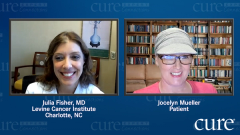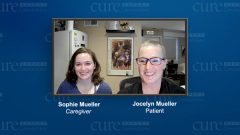
Receiving Treatment for HER2-positive Breast Cancer: The Patient Experience
Jocelyn Mueller describes the preoperative treatments she has received for HER2-positive breast cancer, and the questions she had for her medical care team.
Episodes in this series

Julia Fisher, MD: It’s easy for me to say, “Here are the drugs, here’s the administration, and here’s the intellectual decision-making that goes behind deciding what to use and when.” However, I think it’s important to always acknowledge that the patient’s experience is incredibly important, and varies from person to person. We are all made differently, and the same drugs can affect different people’s physiologies differently. Jocelyn, I’d love it if you could tell us a little bit about your perspective. If you can recall, what was our conversation about how your disease could be treated when we first met? Did you have questions about the treatment?
Jocelyn Mueller: Again, I think I came in with a lot more information than your average patient because of my sister. She had told me about the targeted therapy. I saw the pathology report and thought, “This is such horrible news.” And she said, “Actually, the HER2-positive [diagnosis] gives us a lot more options for medications, that’s a good thing.” She had also told me that I would probably have neoadjuvant chemotherapy, which terrified me. When I met with you, and when you started talking about the targeted therapy, I kept hearing over and over that it was such a game-changer. I’ve mentioned this to you; I work with a woman who 17 years ago was in the clinical trial for Herceptin [trastuzumab]. It gives me goosebumps when I think about it, and I thank her every time I see her because she paved the way for these drugs to be used now, and I know that they’ll make a big difference in my long-term recovery. I knew that it was aggressive; I kept having to be reassured that it was treatable. I know I asked you and [Richard] White, [M.D.,] several times about what my prognosis was because that was at the top of my mind. I wanted to know what side effects I was going to have with the chemo, and I told both of you my biggest fear was vomiting; I hate to vomit, I hate that feeling. You both said, “That’s the easiest thing for us to control.” Four treatments in, I have had no vomiting at all, it is controllable. I guess those were the only things. I think I came in with a little more information because my sister and I had talked quite a bit about it.
Julia Fisher, MD: You just alluded to having completed your fourth of these six preoperative treatments. How is treatment going?
Jocelyn Mueller: You know, I had a meltdown in your office yesterday. It’s funny, the first round was rough, really rough. Rounds two and three were not bad at all, to the point where my husband even said, “Are you sure they gave you what they gave you the first time?” I felt great. This one hit me hard. It’s mostly fatigue; while I’m not vomiting there is a lot of nausea, a lot of GI [gastrointestinal] disruption, I have lost my hair, my eyes water a lot because they’re dry; my mouth is dry a lot. It’s a lot of little things. There are a few still out there that I could experience that haven’t hit quite yet. Hopefully, they won’t. You guys and your team have been so great about preparing me and giving me tips. Like I said, I had a friend who went through breast cancer five years ago. She didn’t have the exact same drug regimen, but she also gave me little tips you can do: chewing on ice, putting ice on your hands and feet, and other things that you can do during treatment and after to mitigate a lot of the issues. It’s just that you have to keep thinking about all of it.
Julia Fisher, MD: How has your treatment been monitored as you’ve gone through this process?
Jocelyn Mueller: I meet with you the week after to see how I’m doing. I know I have my nurse navigator and I have Kathy and Callie, your nurses, to help me at any step along the way. I will email them and ask questions or ask for refills, or advice on this or that, and then I do come in for fluids for two days after. The nurses I meet with then also ask me how I’m doing.
Transcript edited for clarity.

